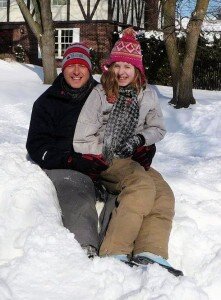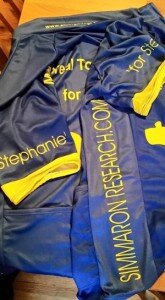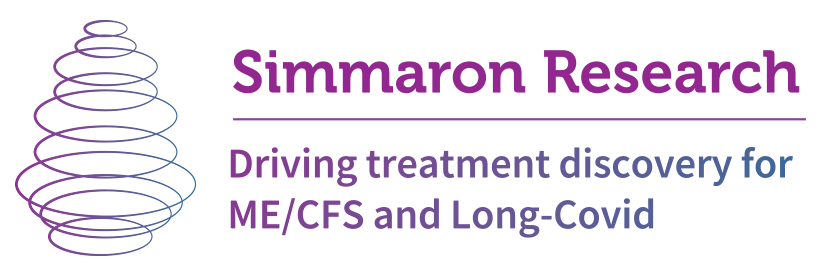A Father Responds: Riding Hard for ME/CFS Research
Everyone's Nightmare
It was a nightmarish situation. Struck down by ME/CFS at the age of eight after a series of staph/herpes infections and infectious mononucleosis, the Spearing's formerly healthy and energetic daughter, Stephanie, was soon confined to her bed.Then it got worse. Much worse. As Stephanie's illness progressed, severe sensory problems left her unable to tolerate bright light, sounds, smells and touch. Migratory nerve and abdominal pain left her in severe pain much of the time. Dysautonomia and muscle weakness left her unable to walk. Food sensitivities and gut problems left her unable to tolerate many foods and her weight dropped precipitously. The UK health authorities were - surprise, surprise - no help at all. They didn't even attempt to be polite in their denials.
Improvement
 It was a tragic story that could have easily lead to an even more tragic ending but Stephanie's move out of the damp UK into the colder but drier climate and more ME friendly health system in Canada helped Rest and more rest, dietary changes, probiotics and immune supplements produced progress.Seven years later Stephanie is still weak but she no longer experiences the severe sensory problems and pain she once did. She's not in school but no longer needs her wheelchair and is able to go on walks. Stephanie's reduced suffering is a great relief to her parents but they want their entire daughter back.
It was a tragic story that could have easily lead to an even more tragic ending but Stephanie's move out of the damp UK into the colder but drier climate and more ME friendly health system in Canada helped Rest and more rest, dietary changes, probiotics and immune supplements produced progress.Seven years later Stephanie is still weak but she no longer experiences the severe sensory problems and pain she once did. She's not in school but no longer needs her wheelchair and is able to go on walks. Stephanie's reduced suffering is a great relief to her parents but they want their entire daughter back.
Riding for ME/CFS Research
They want real relief. They want mounds of research. They want their daughter well and they don't want anyone else to go through what Stephanie and they went through. The awful nights. The walking on tiptoes in order not to cause their daughter - huddled in her bed upstairs - pain from too much noise. The ugly comments from the medical authorities.Everyone is affected by these severe illnesses. Some give up in the face of the opposition but Peter Spearing has just gotten more determined. In three days in his Ride For ME/CFS Research Peter is riding 100 kilometers in Tour de l'Île de Montréal cycling event to raise funds for the Simmaron Research Foundation. He's going to ride full out - as hard as he can.
- Find out more about Peter and his Ride for ME/CFS here
 When asked why they choose the Simmaron Research Institute Stephanie's mother Suzy emphasized Dr. Peterson's years of experience, and the close ties the Institute has forged with important research efforts across the globe. One of the first articles they read about ME/CFS, she noted, involved Dr. Peterson's efforts in the Incline Village outbreak over thirty years ago.Created in 2012, the Simmaron Research Institute is dedicated to scientifically redefining how ME/CFS is studied and treated. It's dedicated to giving people like Stephanie options. To breaking up the ignorance that is causing so many people to be cruelly treated. To producing an environment in which ME/CFS is given the resources that other chronic illnesses are.The Institute is currently participating in and/or funding work on
When asked why they choose the Simmaron Research Institute Stephanie's mother Suzy emphasized Dr. Peterson's years of experience, and the close ties the Institute has forged with important research efforts across the globe. One of the first articles they read about ME/CFS, she noted, involved Dr. Peterson's efforts in the Incline Village outbreak over thirty years ago.Created in 2012, the Simmaron Research Institute is dedicated to scientifically redefining how ME/CFS is studied and treated. It's dedicated to giving people like Stephanie options. To breaking up the ignorance that is causing so many people to be cruelly treated. To producing an environment in which ME/CFS is given the resources that other chronic illnesses are.The Institute is currently participating in and/or funding work on
- The gut microbiome
- Tick, mosquito borne and other pathogens
- Determining subsets and defining ME/CFS
- Epidemiology including the long term effects of ME/CFS
- A genomic analysis of immune cell functioning
- The cause of the natural killer cell dysfunction
- The extent of severe T-cell abnormalities found
- Autoimmunity, non-Hodgkin's lymphoma and cancer prevalence
- Ampligen's effectiveness in treating ME/CFS
- Spearheading efforts to make immune tests a standard part of diagnostic protocols
- Collaborating with Columbia University to train future doctors how to treat ME/CFS
 Peter, Suzanne and Stephanie request that you support Peter's efforts to bolster ME/CFS research by donating to the Simmaron Research Institute here. Everyone, young and old, deserves a shot at a normal, healthy life. (Please reference Stephanie Spearing in the dedication box provided).
Peter, Suzanne and Stephanie request that you support Peter's efforts to bolster ME/CFS research by donating to the Simmaron Research Institute here. Everyone, young and old, deserves a shot at a normal, healthy life. (Please reference Stephanie Spearing in the dedication box provided).
